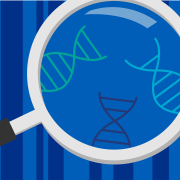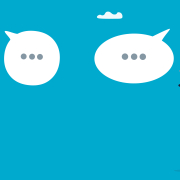What can pop culture tell us about genetics?
Special guest author Dr Jonathan Roberts looks at how pop culture can help us think about genetics in different ways
I leave worrying about the accuracy of genetics and genomics in popular culture to other people. Instead, I have long argued that pop culture – films, TV shows, books – can help us all think about this science in different, often fun and creative ways by providing us with new tools through which to view it.
Below I will explore five ways in which we can think differently about genetics, and explore some of today’s key issues in the science, with the help of pop culture.
Genes as a recipe: The Great British Bake Off
DNA made an appearance in The Great British Bake Off this year when Syabira, one of the contestants, produced a giant cake in the shape of a double helix.
One way to think about our genes is to imagine them as a recipe. When it comes to understanding genetics, it’s easy to develop the false idea that there is a gene for every human trait. The idea of a recipe can help us think outside this box.
The way our genes work can be affected by how we are brought up and how we live: the food we eat, for example, and our exposure to pollution. Genes, like recipes, do nothing on their own. Something has to happen to them. This means that the same genes in different situations will produce different results. It’s a bit like the technical challenge in The Great British Bake Off: each baker uses the same recipe but will produce a very different bake. This ‘genes are a recipe’ metaphor can tune us into the dynamic nature of genetics and help us think about genes in a less deterministic way.
Genes as music: Who owns what?
The idea of genes as music has been used in several creative ways. Here, I want to draw attention to the complex nature of creativity and ownership.
In the last few years, there have been a number of major plagiarism cases within the music industry. Ed Sheeran recently won his plagiarism case, while in 2019 Robin Thicke and Pharrell Williams famously lost their case to Marvin Gaye: the court ruled that they had copied his groove.
Plagiarism of music is an interesting topic. To some extent, it can be argued that no composer creates something totally new, that they are instead taking existing structures and rearranging them in new ways.
The company Myriad Genetics famously (or infamously) patented the BRCA1 and BRCA2 genes in 1997. In 2013, the Supreme Court of the United States unanimously ruled that human genes cannot be patented; however, this didn’t stop Myriad Genetics from holding on to their precious data about the genes they had gathered over the years – data they have only just released.
The idea of genes as music can help us think about what we (collectively as a society) actually own. Our genetic diversity is our human legacy; to claim ownership of it is like trying to claim ownership of music. However, in our society (as in music) there is a constant need for innovation, to create new things. What if a company creates new genes using gene editing technology, such as CRISPR? Should they be allowed to patent those new genes? How we reward innovation when people are using resources that, arguably, cannot belong to anyone is a key question for genetics, not just for Ed Sheeran.
Genes as destiny: CODA
The film CODA is a coming-of-age story about Ruby, a hearing child whose parents and brother are deaf. Ruby dreams of going to music college and becoming a singer. The film is a good way of highlighting the social model of disability, which argues that many things that are viewed as disabilities are actually just differences, and that people are disabled by the barriers they face in society as opposed to their differences. When disability is viewed from this perspective, the solution is surely to change society, not biology.
These issues are very relevant to the fields of genetics and genomics right now. We are starting to understand in greater detail the genetic architecture of many human traits, including inherited conditions and complex qualities like intelligence. One concern is that we may end up living in a world in which we have come to believe that all human traits are determined solely by our genes. This idea is often referred to as genetic determinism, and much dystopian fiction is based on it.
CODA serves as an emotive and powerful reminder to pay attention to complexity, to understand that even if something has a genetic cause, society may still be the issue.
Genes as a commodity: Margaret Atwood’s MaddAddam trilogy
Margaret Atwood is probably best known for The Handmaid’s Tale. If you haven’t read her beautifully dystopian MaddAddam trilogy, though, I thoroughly recommend it. It tells the tale of a world brought to destruction by biotech companies relentlessly pursing profit, of humanity doomed by rampant inequality and science without responsibility.
It’s interesting to note what happens when we view genes as a commodity, a resource to be exploited for profit. Many of our ethical concerns about genetics come from a violation of the idea that genes are sacred. For example, arguments that are made against genetic engineering often go along the lines of ‘Humans should not play God.’
A key goal for many who work in genetics is to see new genetic technologies benefit everyone. The reality is that new medical treatments can only come about by allowing biotech companies to profit from genetic research. How do we align these two motives? Atwood’s series challenges us to understand that we can see genes as a commodity yet strive for the equitable use of new genetic technologies.
Genes as identity: Elf
Any top Christmas film list must include Elf. My golden Christmas trilogy is Die Hard, The Muppet Christmas Carol and Elf. Don’t @ me.
Elf is a film about identity. For those of you who don’t know, the protagonist, Buddy, accidentally ends up in the North Pole and is raised by Santa and his elves. Eventually he travels to New York where he finds his father, Walter, who doesn’t believe that Buddy is his son until a DNA test proves it.
The idea that your genes are your identity is a powerful one. The genetic testing company 23andMe used this when they began to market their genetic tests with the tagline ‘Welcome to you’. DNA ancestry tests, a popular Christmas gift, have a similar appeal. Understanding their ancestry helps people feel that they know more about themselves.
In Elf, though, it takes more than genetics for Walter to become Buddy’s father. It is only when Walter – with some Christmas magic and help from Santa – accepts Buddy that he truly becomes his father. It’s a wonderful, cheesy, Christmassy reminder that, despite what some people might tell you and while DNA does matter, we are so much more than our genes.
Dr Jonathan Roberts is a genetic counsellor and postdoctoral researcher focusing on genetics and pop culture as part of the society and ethics research programme within the Wellcome Genome Campus.
–









